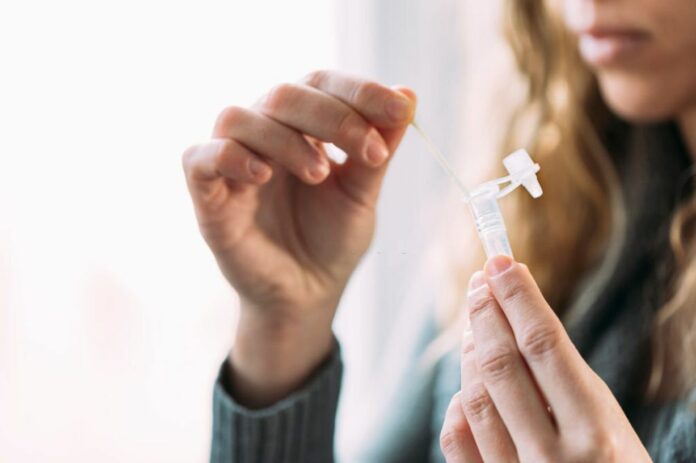A recent study in Scientific Reports showed that cetylpyridinium chloride is effective against SARS-CoV-2 infection. Cetylpyridinium chloride is a compound made of ammonium that is often found in mouthwash.
SARS-CoV-2, the causative pathogen of the coronavirus (COVID-19) pandemic, is an enveloped, positive-sense, single-stranded RNA virus belonging to the human betacoronavirus family. The virus and its more dangerous variations have caused more than 590 million confirmed infections and over 6.4 million deaths, which is the most damage ever done to the world’s health care system.
SARS-CoV-2 enters the human body primarily through the respiratory epithelium, which has large quantities of the entry receptor angiotensin-converting enzyme 2. (ACE2). There is proof that the virus can grow in the mouth and discharge itself into the saliva. The research has also demonstrated a relationship between COVID-19 aggravation and salivary SARS-CoV-2 concentration.
The current study explored the antiviral efficacy and method of action of cetylpyridinium chloride against SARS-CoV-2 infection.
The antimicrobial chemical cetylpyridinium chloride is commonly used in mouthwashes with the purpose of warding off oral illnesses caused by bacteria, fungi, and viruses. It is known that the compound kills bacteria by breaking up lipid membranes through physical and chemical interactions. Cetylpyridinium chloride appears to be effective against wild-type SARS-CoV-2 at modest concentrations (10–50 g/ml), according to a few investigations.
Effect of cetylpyridinium chloride on the contagiousness of SARS-CoV-2
The study investigated the antiviral activity of cetylpyridinium chloride on a variety of SARS-CoV-2 strains, including the alpha, beta, and gamma variants as well as the wild-type SARS-CoV-2. The plaque assay was done to see how infectious the virus was with and without the compound.
The results showed that cetylpyridinium chloride considerably reduces the infectivity of all tested SARS-CoV-2 strains in a dose-dependent manner at low doses (5–40 g/ml). The concentrations that were tested were less than what is used in commercial mouthwash (50 g/ml).
How cetylpyridinium chloride affects the spread of viruses
In order to determine the impact that cetylpyridinium chloride has on the process of viral entry, ACE2-expressing cells were infected with wild-type SARS-CoV-2.
The results showed that in a dose-dependent way, cetylpyridinium chloride dramatically lowers the expression and copy number of viral RNA. According to these results, cetylpyridinium chloride decreases the amount of infectious virus before it enters the host cell.
Cetylpyridinium chloride salivary antiviral activity
Saliva is extremely thick and full of proteins, which could compromise cetylpyridinium chloride’s ability to fight viruses. To find out how well cetylpyridinium chloride works against viruses in saliva, it was mixed with the virus and saliva from healthy people.
The results showed that cetylpyridinium chloride strongly and dose-dependently reduces viral infectivity even in saliva.
The way that cetylpyridinium chloride fights viruses
To ascertain the effect of cetylpyridinium chloride on viral morphology, sucrose density analysis and transmission electron microscopy were applied to SARS-CoV-2 that had been treated with the substance.
The results showed that cetylpyridinium chloride has no effect on the structure of the virus as a whole. After being treated with cetylpyridinium chloride, SARS-spherical CoV-2’s particle structure remained unaltered.
Study significance
The research shows how effective cetylpyridinium chloride is at inhibiting SARS-CoV-2 and its variations, even at low concentrations. The compound’s ability to stop viruses from spreading stays the same in human saliva.
A commercial mouthwash with a similar level of cetylpyridinium chloride as that used in the study was examined for its antiviral effectiveness. The mouthwash had antiviral efficacy comparable to or superior to that of pure cetylpyridinium chloride solution. This shows that the anti-SARS-CoV-2 activity of cetylpyridinium chloride is not affected by the other components in the mouthwash.
The research reveals that the anti-SARS-CoV-2 activity of cetylpyridinium chloride is most likely caused by denaturing viral proteins rather than by lipid membrane disruption.
The study’s findings suggest that using products with cetylpyridinium chloride as a preventative step can slow the spread and course of SARS-CoV-2 illness.
In a clinical study that is still going on, researchers are looking at how cetylpyridinium chloride affects the amount of SARS-CoV-2 virus in the saliva of COVID-19 patients.
Image Credit: Getty
You were reading: Turns Out, Your Mouthwash Can Suppress Coronavirus And its Viral Infectivity Even In Saliva
